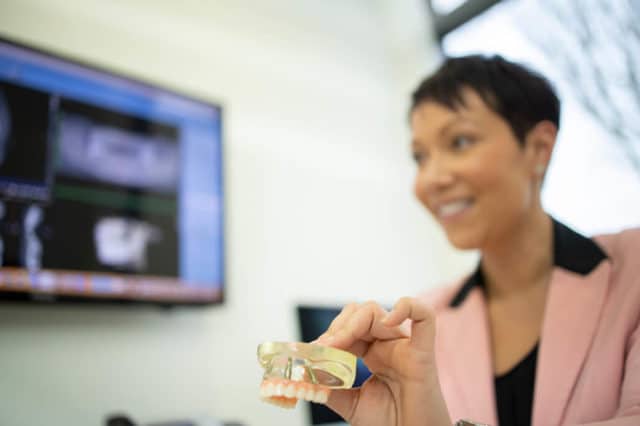
- What Are Dental Implants? Dental implants are tiny posts that attach to your jaw. They act as the root of a tooth. With a connector or abutment, they fuse to tooth-like crowns to create new replacement teeth. The majority of dental implants are made from titanium. If you are looking for dental implants in Fort Worth or Dallas, TX, our team will happily answer any questions you may have. There are many types of dental implant procedures. One of our dental implant specialists can help you decide which type of dental implant is best for you.
- There are different ways that implants can be inserted. These include:
-
Endosteal Implants
Endosteal implants are the most common type of implant and are placed directly into the jawbone. These implants are typically made of titanium and are shaped like small screws. They are a great option for patients who have enough healthy jawbone to support the implant.
-
Subperiosteal Implants
Subperiosteal implants are placed on top of the jawbone, rather than being inserted into it. These implants are typically used for patients who do not have enough healthy jawbone to support endosteal implants. The implant is held in place by a metal frame that sits on top of the jawbone, and the posts of the implant protrude through the gums.
The type of dental implants that you need will depend on a variety of factors, such as how many missing teeth you have and their location, and the health of your jawbone. As a dental implant center, we offer all types of dental implants and procedures to best suit your unique needs. Our specialists will consult with you on the following options to and answer any questions you may have.
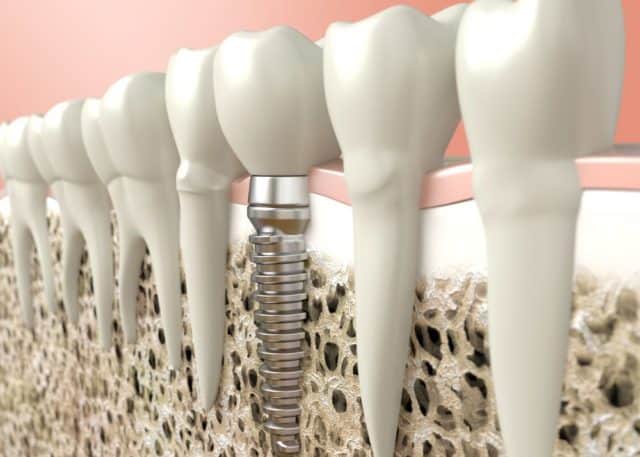
- Single Tooth Implants A single-tooth implant is a stand-alone implant that is used to replace a single missing tooth. The implant is placed into the jawbone, and a replacement tooth, or crown, is then attached to the implant post. Single-tooth implants offer a natural-looking and long-lasting solution for missing teeth, and they also help to preserve the structure of the surrounding teeth and jawbone. They are a great option for patients who only have one or two missing teeth and want to replace them with a stable, permanent, and natural-looking solution. Learn More
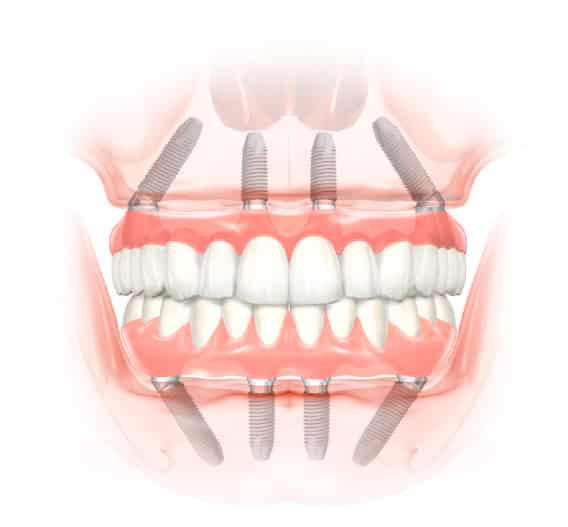
- All-on-4 Implants All-on-4 implants are a type of endosteal implant that uses just four implants to support a full arch of replacement teeth. This treatment is a great option for patients who are missing most or all of their teeth, as it can provide a strong, stable base for replacement teeth without the need for a full jawbone. Learn More
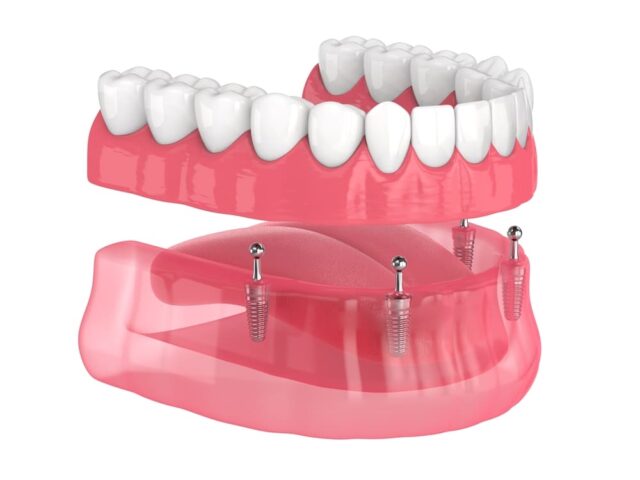
- Snap-on Dentures Snap-on dentures, also known as implant-supported dentures, are a type of denture that snaps onto a series of dental implants. This type of denture offers a more secure and stable fit than traditional dentures and can improve the patient's ability to chew and speak. Snap-on dentures can be removed for cleaning and maintenance, but they are designed to stay in place during normal activities. They are a great option for patients who are missing most or all of their teeth and want a more stable and secure solution than traditional dentures. Learn More
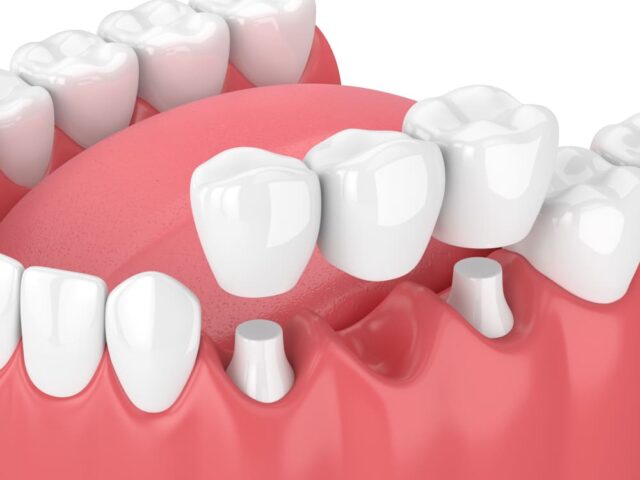
- Implant Bridges An implant bridge is a type of dental implant that is used to replace multiple missing teeth. The bridge is supported by two or more dental implants, which are placed into the jawbone. The bridge is then attached to the implant posts, creating a stable base for the replacement teeth. Implant bridges offer a natural-looking and long-lasting solution for missing teeth, and they also help to preserve the structure of the surrounding teeth and jawbone. They are a great option for patients who are missing several teeth in a row but who still have healthy teeth on either side of the gap. Learn More
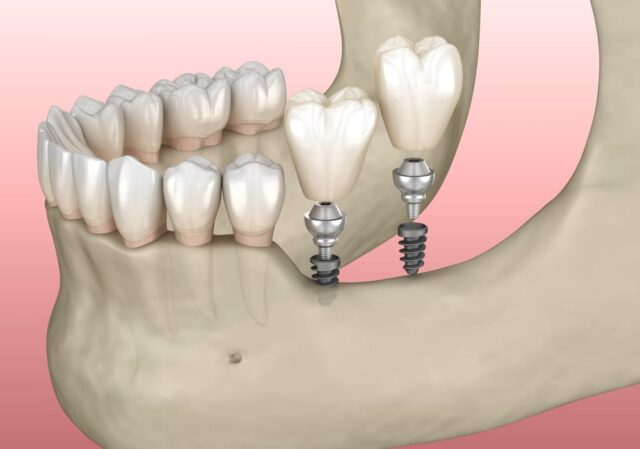
- Mini Implants Mini implants are a smaller version of endosteal implants that are used to support smaller replacement teeth, such as a single tooth or a denture. They are a great option for patients who have limited jawbone or those who want a less invasive procedure. Learn More
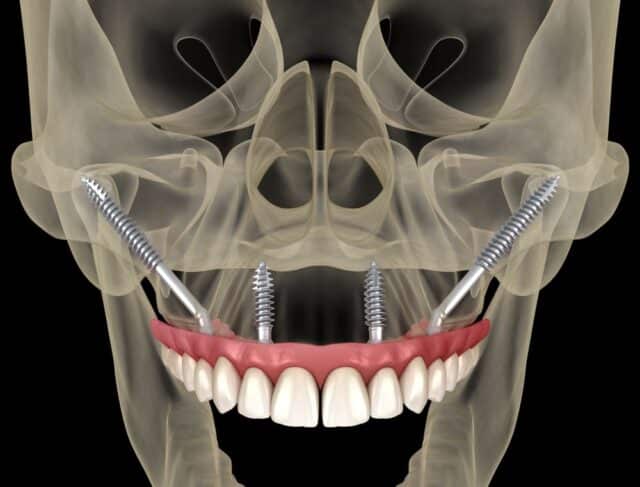
- Zygomatic Implants Zygomatic implants are a type of implant that is used in cases where the patient has severe bone loss in the upper jaw. These implants are longer than traditional implants and are anchored in the zygomatic bone, which is located in the cheekbone. This allows for a secure and stable foundation for replacement teeth, even in cases where the jawbone is not strong enough to support traditional implants. Learn More
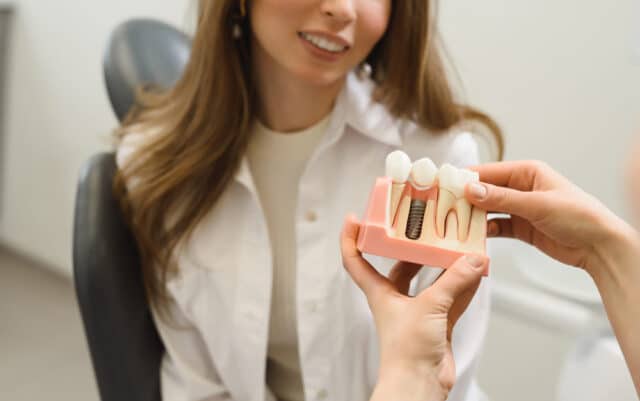
- Immediate Load Implants (Teeth In a Day) Immediate load implants, also known as "teeth in a day" implants, are a type of implant that allows patients to have replacement teeth placed on the same day as the implant surgery. This type of implant is typically used for patients who have enough healthy jawbone to support the implant and are looking for a more convenient and efficient treatment option.
- Additional Procedures for Dental Implants In some cases, a patient may require an additional procedure in order to continue with dental implant treatment. Our specialists will consult with you and prepare a customized treatment plan for your unique smile.
-
Sinus Lift
A sinus lift is a procedure that involves adding bone to the upper jaw in the area of the molars and premolars. This is necessary when there is not enough bone in that area for traditional dental implant placement. During the procedure, a small incision is made in the gum tissue and a small amount of bone is added to the area. This procedure is done to prepare the area for the placement of a dental implant.
-
Bone Grafting
Bone grafting is a surgical procedure that is used to rebuild or regenerate jawbone that has been lost due to injury, disease, or tooth loss. This procedure is often necessary for patients who want to receive dental implants but do not have enough healthy jawbone to support the implant.
There are different types of bone grafting procedures, including:
- Autograft: This type of bone graft uses bone taken from the patient's own body, typically from the hip or the chin.
- Allograft: This type of bone graft uses bone from a cadaver donor.
- Xenograft: This type of bone graft uses bone from an animal, typically a cow.
- Alloplastic: This type of bone graft uses synthetic bone substitute material.
The bone grafting procedure is typically performed before the implant placement to ensure that the implant will have a strong foundation to integrate with. The bone grafting procedure may require several months to heal, and during this time, the patient will not be able to place any load on the grafted area. After the healing process, the implant placement procedure can be performed, and the implant will have a strong foundation to integrate with.
At our dental implant centers in Dallas and Fort Worth, our experienced implant dentists will evaluate your jawbone density and determine if a bone graft is necessary for your implant procedure. We use the latest techniques and materials to ensure the best possible outcome for your smile.

-
Which Implants Are Right for You?
At our dental implant centers in Dallas and Fort Worth, we have the expertise and technology to offer a wide range of implant options to meet the unique needs of each patient. Our team of experienced implant dentists will work with you to determine the best type of implant for your individual needs and goals, ensuring the best possible outcome for your smile.
If you are considering dental implants as a solution for missing teeth, contact us today to schedule a free consultation at one of our convenient locations in Fort Worth and Dallas, TX.







